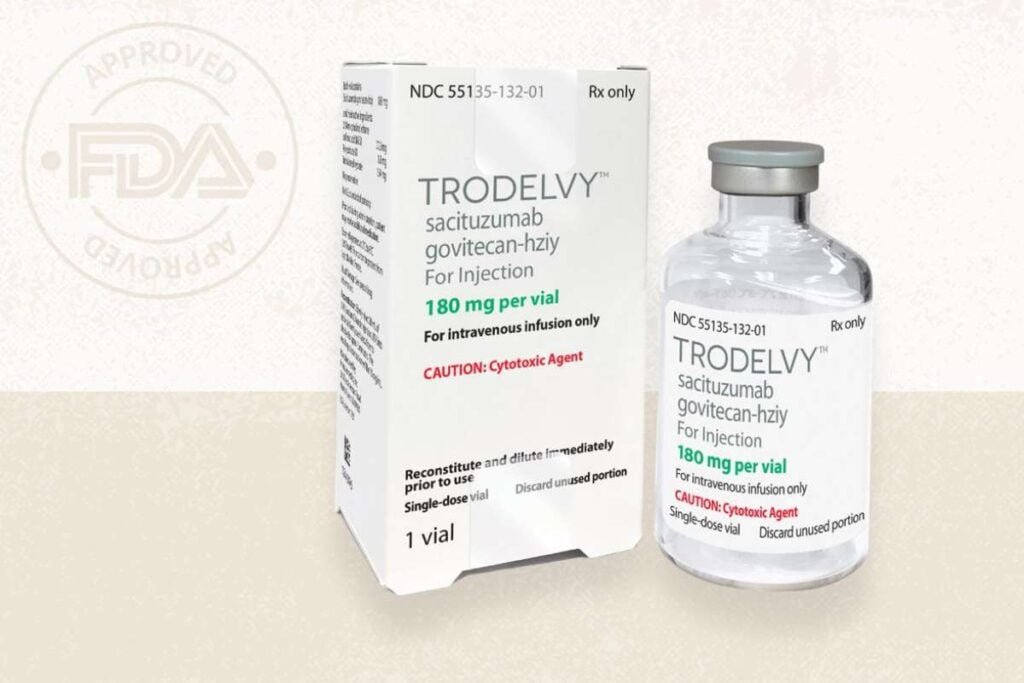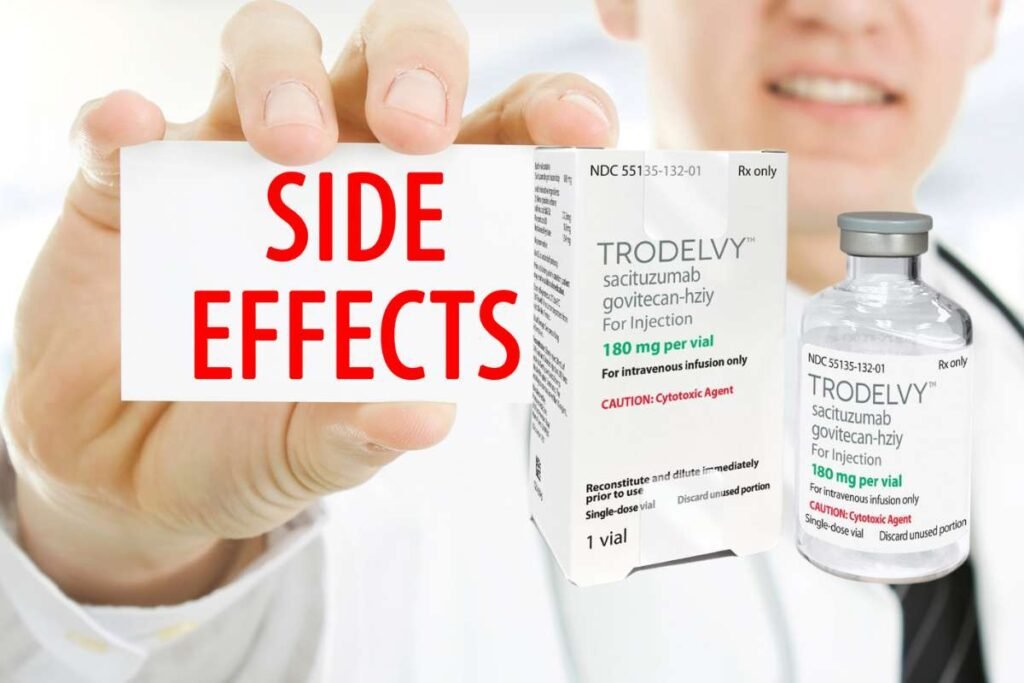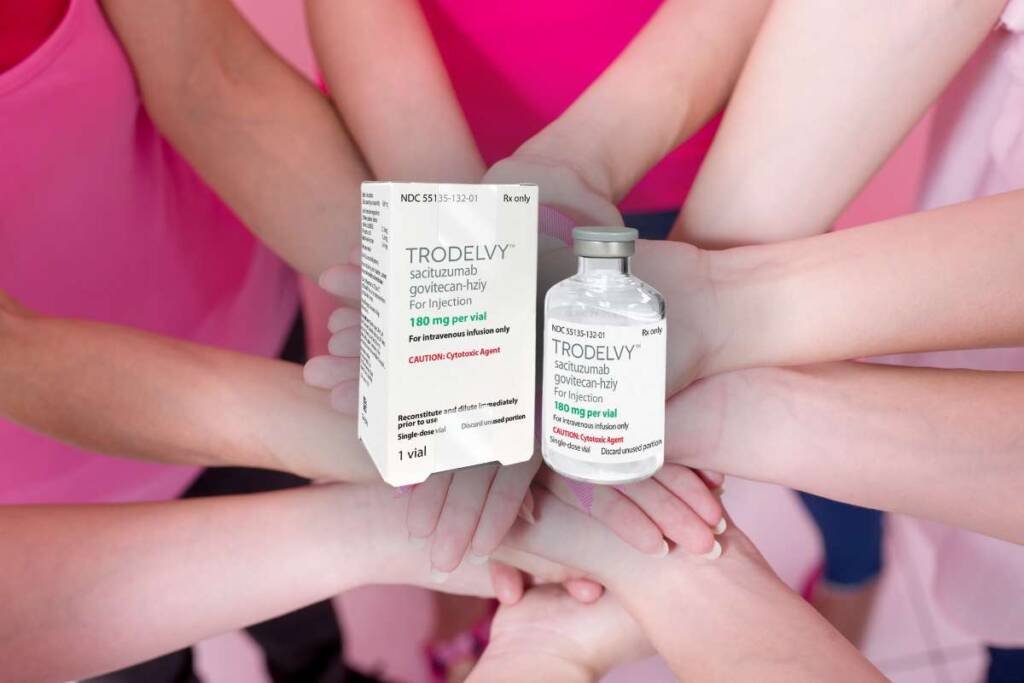Trodelvy is a brand name for sacituzumab govitecan-hziy, a new type of drug that combines an antibody with a chemotherapy agent. Trodelvy is designed to target and kill TNBC cells that have a protein called Trop-2 on their surface. Trop-2 is found in high levels on many types of cancer cells, including TNBC. Trodelvy works by attaching to Trop-2 on the cancer cells and delivering a dose of SN-38, a powerful chemotherapy drug that interferes with DNA replication and cell division. SN-38 is the active form of irinotecan, a drug that is used to treat colorectal cancer. By linking SN-38 to an antibody, Trodelvy can deliver more of the drug directly to the cancer cells, while sparing healthy cells.
Breast cancer is the second most common cancer among women, and it can affect anyone, regardless of age, race, or lifestyle. But not all breast cancers are the same. Some are more aggressive and harder to treat than others.
One of the most challenging types of breast cancer is called triple-negative breast cancer (TNBC). This means that the cancer cells do not have receptors for estrogen, progesterone, or HER2, which are hormones that fuel the growth of some breast cancers. TNBC accounts for about 15% of all breast cancers, and it tends to be more common in younger women, African American women, and women with BRCA gene mutations.
TNBC is also more likely to spread to other parts of the body (metastasize) and recur after treatment. Because TNBC does not respond to hormone therapy or targeted therapy, the main treatment options are chemotherapy, surgery, and radiation. However, chemotherapy can have serious side effects and may not work for everyone.
That’s why there is a need for new and better treatments for TNBC. And that’s where Trodelvy comes in.

Trodelvy Approval
Trodelvy has been approved by the FDA in April 2020 for the treatment of adults with metastatic TNBC who have received at least two prior therapies for metastatic disease. In April 2021, the FDA expanded the approval of Trodelvy to include patients with locally advanced or unresectable TNBC who have received two or more prior systemic therapies, at least one of them for metastatic disease. Later in February 2023, the FDA approved sacituzumab govitecan-hziy for patients with unresectable locally advanced or metastatic hormone receptor-positive, HER2-negative breast cancer who have received endocrine-based therapy and at least two additional systemic therapies in the metastatic setting.
Trodelvy has also been approved by the European Commission in November 2021 for treatment of adult patients with unresectable or metastatic triple-negative breast cancer (TNBC) who have received two or more prior systemic therapies, at least one of them for advanced disease. Later in January 2023, EMA approved Trodelvy for the treatment of adult patients with unresectable or metastatic HR-positive, HER2 -negative breast cancer who have received endocrine-based therapy and at least two additional systemic therapies in the metastatic setting.
On 22 June 2023, the Committee for Medicinal Products for Human Use (CHMP) adopted a positive opinion recommending a change to the terms of the marketing authorisation for Trodelvy than later in July 2023 it got approval for the treatment of HR-positive HER2-negative breast cancer who have received endocrine-based therapy, and at least two additional systemic therapies in the advanced setting.
Trodelvy is given as an intravenous infusion once every week for two weeks, followed by a week off. The treatment cycle can be repeated until the disease progresses or the side effects become too severe.

How effective is Trodelvy?
For metastatic TNBC patients who had previously received an average of three prior treatments, Trodelvy shrank tumors in 33% of the patients, and the median duration of response was 7.7 months. The median overall survival was 13 months. These results were considered significant, considering that the average survival for metastatic TNBC patients is usually less than a year.
For locally advanced or metastatic TNBC patients who had previously received an average of two prior treatments, Trodelvy improved overall survival by 57% compared to chemotherapy alone. The median overall survival was 12.1 months for Trodelvy versus 6.7 months for chemotherapy. Trodelvy also improved progression-free survival by 50% compared to chemotherapy alone. The median progression-free survival was 5.6 months for Trodelvy versus 1.7 months for chemotherapy.
For unresectable or metastatic HR-positive, HER2-negative breast cancer patients who had previously received endocrine-based therapy and at least two additional systemic therapies in the advanced setting, Trodelvy demonstrated a statistically significant and clinically meaningful overall survival benefit of 3.2 months versus comparator single-agent chemotherapy (median OS: 14.4 months vs. 11.2 months). Trodelvy also demonstrated a 34% reduction in risk of disease progression or death (median PFS: 5.5 versus 4.0 months).

What are the side effects of Trodelvy?
Like any drug, Trodelvy can cause side effects. The most common ones include nausea, neutropenia (low white blood cell count), diarrhea, fatigue, anemia (low red blood cell count), vomiting, hair loss, constipation, decreased appetite, rash, and abdominal pain.
Some of these side effects can be severe and life-threatening, such as neutropenia and diarrhea. Neutropenia can increase the risk of infections, while diarrhea can lead to dehydration and kidney problems. Therefore, it is important to monitor your blood counts and report any signs of infection or dehydration to your doctor.
Trodelvy can also cause harm to a developing fetus or newborn baby. Therefore, women who are pregnant or breastfeeding should not use Trodelvy. Women who are able to become pregnant should use effective contraception during and after treatment with Trodelvy.
How much does Trodelvy cost?
Trodelvy is not cheap. According to the manufacturer, Gilead Sciences, the list price of Trodelvy is $22,500 per month, or $270,000 per year. However, this does not include the cost of administration, monitoring, or supportive care. The actual cost may vary depending on your insurance coverage, co-payments, deductibles, and other factors.
If you are having trouble affording Trodelvy, you may be eligible for financial assistance from the manufacturer or other sources. You can contact the Trodelvy Access Support Program at 1-844-TRODELVY (1-844-876-3358) or visit www.trodelvy.com for more information.
Conclusion
In conclusion, Trodelvy (sacituzumab govitecan-hziy) represents a promising new hope for breast cancer patients, particularly those with challenging triple-negative breast cancer (TNBC) and hormone receptor-positive, HER2-negative breast cancer. This innovative drug, approved by the FDA and the European Commission, combines an antibody with a powerful chemotherapy agent to target and kill cancer cells more effectively while sparing healthy cells.
Clinical trials have shown that Trodelvy has demonstrated significant efficacy in various types of breast cancer. For metastatic TNBC patients, it has shown tumor shrinkage in a considerable number of cases, with improved overall survival compared to standard chemotherapy. Additionally, for patients with HR-positive, HER2-negative breast cancer, Trodelvy provided a meaningful survival benefit and reduced the risk of disease progression.
However, like any treatment, Trodelvy comes with side effects, some of which can be severe. Patients may experience nausea, diarrhea, fatigue, hair loss, and other symptoms, requiring careful monitoring and management. Women who are pregnant or breastfeeding should avoid Trodelvy due to potential harm to the fetus or newborn.
The cost of Trodelvy is substantial, and patients may face financial challenges in accessing the treatment. Nonetheless, there are resources available for financial assistance, and patients are encouraged to explore options to help alleviate the burden.
Overall, Trodelvy represents a significant advancement in breast cancer treatment and offers renewed hope for patients facing challenging forms of the disease. As research and development in oncology continues, it is essential to keep exploring new therapies that can further improve outcomes and quality of life for breast cancer patients and their loved ones.





























